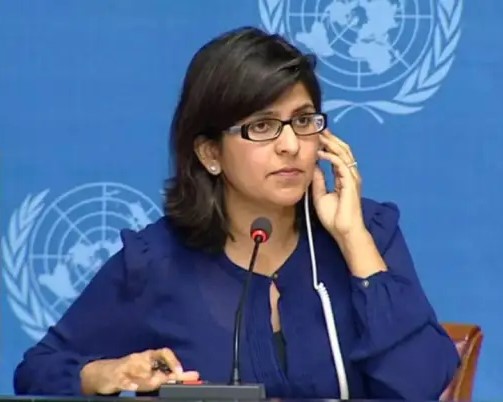
Ravina Shamdasani, serving as the Chief Spokesperson for the UN Human Rights Office, is proficient in English, French, Hindi, and Sindhi
Sindh Courier Monitoring Desk
Ravina Shamdasani is a prominent figure in the realm of human rights activism, where she has served as the spokesperson for the UN Human Rights Office, which joined in 2010, and now she is the Chief Spokesperson. Throughout her career, she has passionately advocated for human rights and has been an outspoken critic of abuses worldwide. As a UN human rights advocate, part of her mission involves using the media to raise awareness about these injustices.
Ravina Shamdasani considers Hong Kong her hometown, where she was raised. Shamdasani was born in Singapore but spent her formative years in Hong Kong. She furthered her education in the United States at Northwestern University.
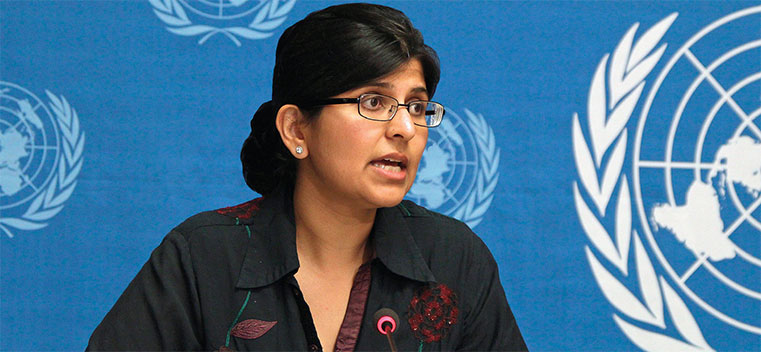 The parents of Ravina Shamdasani might have migrated from the Sindh province in present-day Pakistan, with many migrating to India after the 1947 partition. A number of Sindhi families are settled in Singapore and Hong Kong, some of them even before the partition of Indian subcontinent. Shamdasani is proficient in English, French, Hindi, and Sindhi. Her diverse language skills enable her to engage with a global audience and effectively advocate for human rights on an international scale.
The parents of Ravina Shamdasani might have migrated from the Sindh province in present-day Pakistan, with many migrating to India after the 1947 partition. A number of Sindhi families are settled in Singapore and Hong Kong, some of them even before the partition of Indian subcontinent. Shamdasani is proficient in English, French, Hindi, and Sindhi. Her diverse language skills enable her to engage with a global audience and effectively advocate for human rights on an international scale.
Ravina Shamdasani’s career has been defined by her unwavering commitment to human rights advocacy. She plays a pivotal role in spotlighting human rights violations on a global scale. During her academic journey, Shamdasani pursued a degree in journalism and political science at Northwestern University in the United States. Following her graduation, she briefly ventured into the field of public relations in Chicago before returning to her calling as a journalist.
In an interview to Stephanie Russell, editor of Northwestern magazine, Shamdasani said, “I am passionate about ensuring that the U.N. human rights office has a robust public voice so that we’re able to amplify the voices of the victims, speak truth to power and alert the international community about the commission of serious human rights violations, so they can address or prevent them from occurring.”
Ravina Shamdasani was 11 years old and living with her family in Hong Kong when right outside her school she saw massive student protests in 1989, just before the June 4 Tiananmen Square massacre in Beijing. Then in 1997 she witnessed the handover of the former British colony to China. “So I grew up at a time in Hong Kong when human rights and politics were very much at the top of our minds, because we were going to be handed over from the U.K. to China and would have to face all the uncertainties that come with that.”
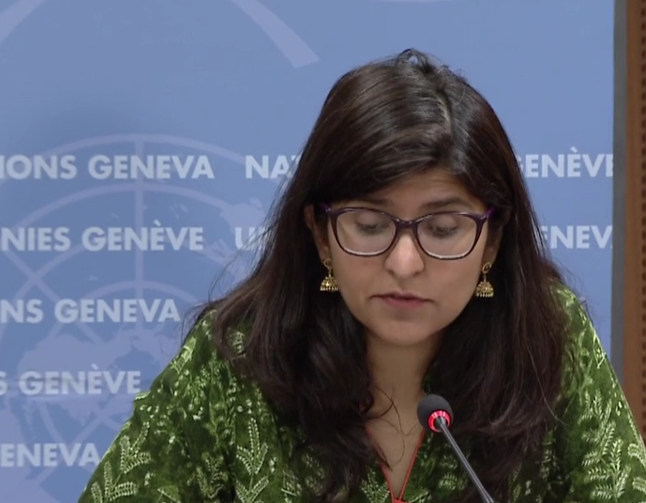 Ravina Shamdasani speaks loudly against human rights violations around the globe in her press job with the United Nations.
Ravina Shamdasani speaks loudly against human rights violations around the globe in her press job with the United Nations.
It was during the handover that Shamdasani decided to go into journalism. She thought, “I’m good at writing, I have an interesting perspective on things, given my background, and I’m interested in social issues. And, most importantly, this is a time when you need watchdogs to make sure that when this delicate transition is happening, the rights of people are protected.”
During her time in Hong Kong, Shamdasani also collaborated with a non-governmental organization (NGO) focused on assisting ethnic minority immigrants and refugees in New Zealand. This experience allowed her to gain a deeper understanding of the challenges faced by marginalized communities and further fueled her commitment to human rights advocacy.
Shamdasani opted to go to the States for college because “no country values freedom of expression as much as the United States,” she says. Just as she was beginning to look at schools, she met Medill professor Abe Peck when he was in Hong Kong on business, and their conversation convinced her that Medill was the school for her.
After graduation, Shamdasani worked briefly in public relations in Chicago but soon went back to journalism when she a got a job in her hometown with the South China Morning Post. She naturally gravitated toward covering human rights issues and ended up creating a human rights beat at the newspaper, particularly relating to refugees, discrimination and national security laws. It was during this time that she first began to interact with the United Nations.
“I decided eventually that I didn’t just want to write about human rights,” she recalls. “I wanted to go work in the field of human rights.” Shamdasani earned a master of laws in human rights at the University of Hong Kong, shortly after marrying McCormick School of Engineering alumnus Amit Wadhwa ’ (they met as students the summer before their junior year — at the Northwestern Arch on the day that Ravina was learning to ride a bike). When her husband’s employer transferred him to New Zealand, Shamdasani left the South China Morning Post and took a job with a nongovernmental organization in Auckland that worked with ethnic minority immigrants and refugees.
“I want to make young people aware how important their role is. You really aren’t aware of the power that you have as a young person to change the world.” — Ravina Shamdasani
While Shamdasani found it rewarding to help people on a day-to-day basis, she was frustrated with the limited impact of working at the grassroots level. “There was an institutional shortfall that was causing many of the problems the immigrants and refugees were facing,” she says. “So I decided that I wanted to work at a higher level to be able to affect policy, to be able to affect systemic change.”
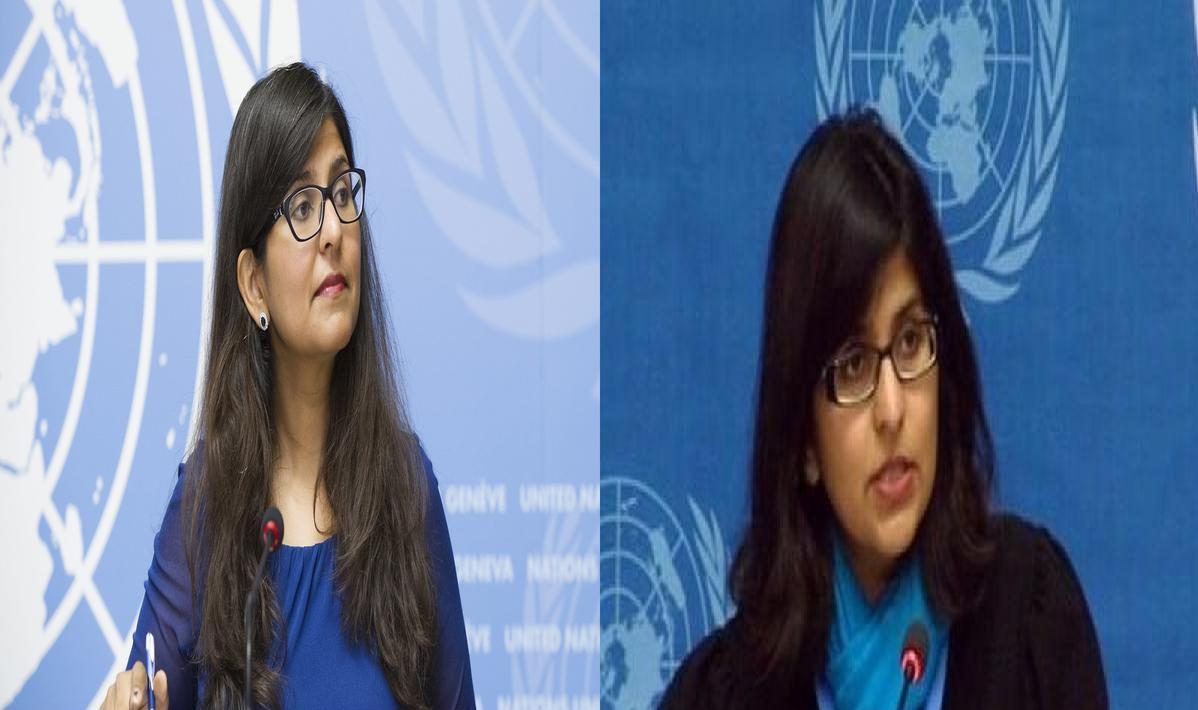 After her husband was accepted into an executive MBA program at INSEAD outside Paris, Shamdasani decided on one of her visits to France to travel to Geneva to network at the United Nations. Her journalism background and master’s in human rights were the right fit for the U.N. human rights office. In 2008 they offered a three-month stint, which then turned into a full-time job that she’s held for nine years.
After her husband was accepted into an executive MBA program at INSEAD outside Paris, Shamdasani decided on one of her visits to France to travel to Geneva to network at the United Nations. Her journalism background and master’s in human rights were the right fit for the U.N. human rights office. In 2008 they offered a three-month stint, which then turned into a full-time job that she’s held for nine years.
When Shamdasani returned to Northwestern last April to speak at a student conference, she sat down with Northwestern magazine editor Stephanie Russell to talk about her work at the United Nations.
Also read: The Sindhis of Shanghai: how an Indian diaspora cracked China
To a question what brought you back to campus for the first time since you graduated in 2000? Ravina said, “Northwestern students decided to host a Model United Nations for about 600 high school students from around the U.S., mostly from the Midwest. It was late January when they invited me to speak, when a lot of us in the world were a bit uncertain about the direction where things were headed and what was happening with populist movements everywhere and recent elections. I immediately thought, ‘Yes, absolutely, I want to go back to the U.S., and I want to speak to the students there. And I want to make young people aware how important their role is as young Americans, as students, as young global citizens, to really reshape the direction of the world.’
And I thought back to when I was a student and recalled that you really aren’t aware of the power that you have as a young person to change the world. It’s kind of an abstract concept.
Lately the U.S. has been questioning its role globally at a very fundamental level. And this is very worrying for those of us who are not Americans and who live in the rest of the world. The United States has been a champion internationally. And the United Nations relies a lot on the U.S. for its support, both financially but also in terms of its moral and political support in pushing the human rights agenda. And should the U.S. withdraw from this completely, that would be a catastrophe.
The rhetoric around that was just very worrying for us, so I welcomed this opportunity to come back and to speak about the importance of the U.N., the work that we do with the support of the U.S. and why it’s so important that we keep doing this work.
About her job
“My job is to be the mouthpiece of the office and to speak out on human rights issues around the world. The great thing about the U.N. human rights office is that we’re based in Geneva. The U.N.’s political headquarters are in New York — that’s where the secretary-general and the Security Council are — but the humanitarian headquarters are in Geneva. That distance gives us a lot more freedom. We are able to speak out on human rights issues, and we’re less bound by political considerations, in a sense, which is what makes the job quite satisfying,” she said.
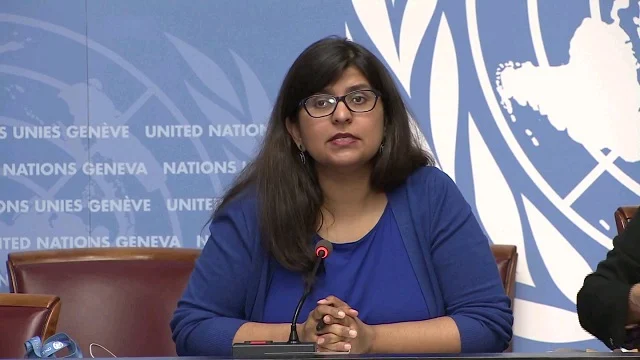 “The U.N. human rights office has a global mandate. So we have a presence in about 60 countries where we cooperate very closely with the governments. It’s not all naming and shaming. We work a lot with governments to build institutions, to do trainings, for example, with police officers, to train them on what their duties are under international human rights law and under their own laws as well. For example, you do not torture to interrogate — there are other methods to use. So we advise on law reform in post-conflict societies. We also advise on constitutions.
“The U.N. human rights office has a global mandate. So we have a presence in about 60 countries where we cooperate very closely with the governments. It’s not all naming and shaming. We work a lot with governments to build institutions, to do trainings, for example, with police officers, to train them on what their duties are under international human rights law and under their own laws as well. For example, you do not torture to interrogate — there are other methods to use. So we advise on law reform in post-conflict societies. We also advise on constitutions.
For example, in Tunisia — which was really the only success story of the Arab Spring — soon after the former president was deposed, we were invited to set up an office there. So we’ve been there since 2011 working hand in hand with the government in crafting the constitution, making sure that NGOs, civil society, people from all walks of life are involved in the process and that they have ownership of that process. So the institution building, law reform, training — all of that, we’re very much active on in these 60 countries. Apart from that, there are the places where we just engage with NGOs and governments, and we try to persuade. Where persuasion and constructive advice and offers of assistance don’t work, then we go public.”
Also read: Ravina Shamdasani raises voice against first execution by nitrogen asphyxiation in USA
Ravina said, “There’s a lot of talk of reforming the U.N. to make it more effective. It’s clear that the U.N. is far from perfect. It does need reform. It does need to be made more effective. And even the secretary-general, António Guterres, has agreed to this. But it all has to be done in a constructive manner. It all has to start from the premise that the U.N. is a very important institution and multilateralism is very important.
The United Nations was set up after the Second World War, so that never again would there be such a war. Any reform of the U.N. has to start from the premise that that goal is still a valid one and that this institution needs to be strengthened to better serve that goal.”
About the Human Rights Council, she said, “It is an intergovernmental body, so it’s a body of states. When they pass a resolution setting up an investigative mission or a fact-finding mission into a particular country, it’s naming and shaming in an international forum by your peers. You are being held to account. So it’s a pretty big deal for states when a commission is set up to review something in a country. Eventually, we might call for the situation to be referred to the Security Council or even to the International Criminal Court. So there are results. You see the impact of your work, which is quite satisfying.
_______________